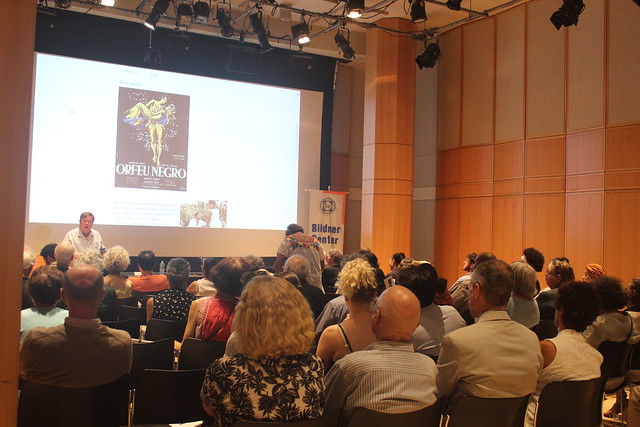"Black Orpheus:" Screening and Discussion
August 11, 2016 - 6:00 pm
Segal Theatre (The Graduate Center, CUNY)
Winner of both the Academy Award for best foreign-language film (1960) and the Cannes Film Festival’s Palme d’Or (1959), Marcel Camus’ Black Orpheus (Orfeu negro) brings the ancient Greek myth of Orpheus and Eurydice to the twentieth-century madness of Carnival in Rio de Janeiro. With its eye-popping photography and ravishing, epochal soundtrack, Black Orpheus was an international cultural event, and it kicked off the bossa nova craze that set hi-fis across America spinning.
Manhã de Carnaval is the main musical theme of the movie composed by Luiz Bonfá and Antônio Maria. Manhã de Carnaval became one of the first compositions identified with Bossa Nova to gain popularity outside Brazil. In the United States, the song is considered to be one of the most important Brazilian Jazz/Bossa songs that helped establish the Bossa Nova movement in the late 1950s. (Wikipedia)
Discussant: Jerry Carlson, The City College and The Graduate Center, CUNY
 Jerry Carlson (Ph.D., University of Chicago) is Director of the Cinema Studies Program in the Department of Media & Communication Arts at The City College, CUNY. He is a specialist in narrative theory, global independent film, and the cinemas of the Americas. He is a member of the doctoral faculties of French, Film Studies and Comparative Literature at the Graduate Center, CUNY and a Senior Fellow at the Bildner Center for Western Hemispheric Studies. Carlson has lectured at Stanford, Columbia, Escuela Internacional de Cine y TV (Cuba), the University of Paris, and the University of São Paulo, among others. His current research is focused on how slavery and its legacy in the New World have been represented in film, literature, and music.
Jerry Carlson (Ph.D., University of Chicago) is Director of the Cinema Studies Program in the Department of Media & Communication Arts at The City College, CUNY. He is a specialist in narrative theory, global independent film, and the cinemas of the Americas. He is a member of the doctoral faculties of French, Film Studies and Comparative Literature at the Graduate Center, CUNY and a Senior Fellow at the Bildner Center for Western Hemispheric Studies. Carlson has lectured at Stanford, Columbia, Escuela Internacional de Cine y TV (Cuba), the University of Paris, and the University of São Paulo, among others. His current research is focused on how slavery and its legacy in the New World have been represented in film, literature, and music.
Carlson is an active producer, director, and writer with multiple Emmy Awards. As a Senior Producer for City University Television (CUNY-TV), he created and produces the series CITY CINEMATHEQUE about film history, CANAPE about French-American cultural relations, and NUEVA YORK (in Spanish) about the Latino cultures of New York City. In 1998 he was inducted by France as a Chevalier de l’Ordre des Palmes.


